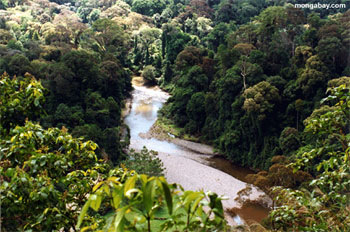Can wildlife conservation banking generate investment returns?
Can wildlife conservation banking generate investment returns?
Rhett A. Butler, mongabay.com
November 27, 2007
A commercial venture in the Malaysian rainforest will seek to generate competitive returns on investment by protecting wildlife. The scheme — signed by the Sabah government and Sydney-based New Forests Pty Ltd — will establish a wildlife habitat conservation bank to manage the 34,000 ha Malua Forest Reserve on the island of Borneo.
Using money from its asset management business, New Forests will to fund rehabilitation and protection of Malua Forest Reserve, a tract of rainforest that supports orangutans and other endangered species. To generate financial returns for investors, New Forests will sell the value of the “forest conservation outcomes” as biodiversity protection credits to palm oil developers, energy firms, and other businesses seeking to provide consumers with environmentally sustainable products including eco-friendly biodiesel. New Forests says the program — modeled after the U.S. endangered species banking market — is the first-of-its-kind in Borneo.
 Rainforest in Sabah on the island of Borneo. Photo by Rhett Butler |
“The objective of the Sabah Government and New Forests is to create a winning situation for all: palm oil companies can help protect rainforest, private investment can make a return from rainforest rehabilitation and conservation, and the Government can offer a solution to current concerns around oil palm plantation,” said David Brand, Managing Director of New Forests. “We hope that via a commercial approach to conservation, we may be able to contribute to a sustainable landscape on Borneo that includes palm oil, timber production and wildlife conservation all being managed on a commercial basis in harmony.”
Environmentalists say Malaysia’s rapid expansion of oil palm plantations over the past decade have come at the expense of biodiverse rainforests that are store large amount of carbon and are home to endangered orangutans, rhinos, and forest elephants. Facing criticism from green groups and potential sanctions in consumer markets, some palm oil producers are working to clean up their operations. Last week the industry-led Round Table on Sustainable Palm Oil (RSPO) announced new criteria for “greener” palm oil production.
The new initiative will give palm oil producers another option in protecting regional biodiversity and forests. It may also provide attractive returns for investors. Mr. Brand says that from a financial standpoint, conservation could be competitive with other types of land use.
“The conservation banking business in the USA is a private equity style business and seeks returns in the 15-25% real IRR range,” Mr. Brand told mongabay.com. “We expect if we are successful here we can generate similar or better returns, which should be competitive with the alternative land uses such as palm oil plantations. In fact that is central to what we have argued to the government–that conservation may ultimately become as if not more commercially attractive than conversion of the forest.














